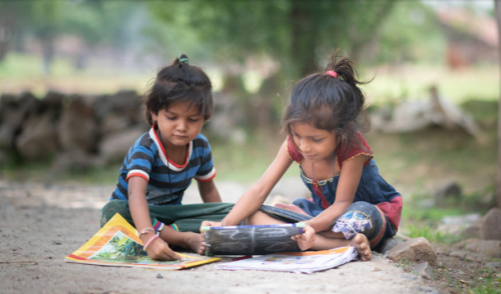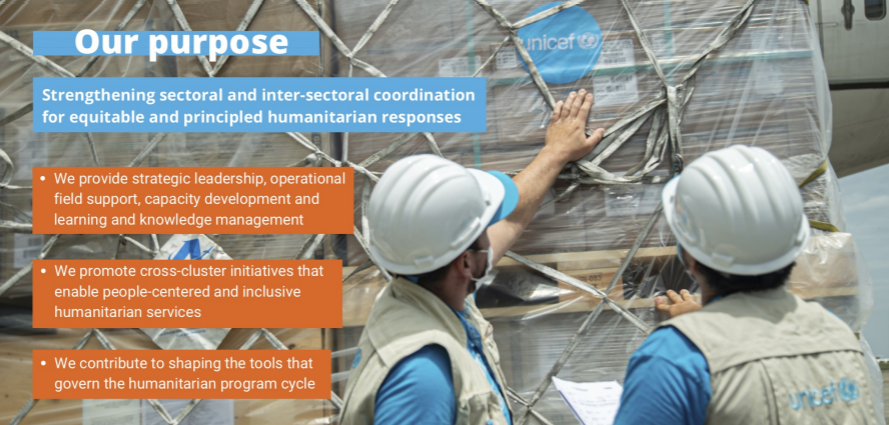2022 HUMANITARIAN PROGRAMME CYCLE LAUNCH
The 2022 Humanitarian Programme Cycle (HPC) planning period has launched in June with the release of the latest facilitation package by OCHA. It contains the HPC calendar as well as the most up-to-date templates and guidance. Additional elements of note are: improvements to the Joint Intersectoral Framework (JIAF) 1.1 guidance and tools; additional information on response
monitoring options; updated Step by Step Guide; emphasis on the 4 IASC ‘non-negotiables’ (GBV, PSEA, AAP, and protection) plus localization. Read more on the JIAF here.
UNICEF-led Global Clusters are launching their seasonal webinar calendar which includes support on the JIAF, sectoral HNO and HRPs, and integration of cross cutting issues such as disabilities, GBV risk mitigation and localization. For more information on specific clusters visit the global cluster websites, subscribe to their newsletters or contact their respective helpdesks.
Cluster Helpdesk links:
WASH Cluster - Education Cluster - Nutrition Cluster - Child Protection AoR

ENHANCED COLLABORATION: JOINT EFFORTS IN NATIONAL AND LOCAL EDUCATION AND CHILD PROTECTION RESPONSES
The Global Education Cluster (GEC) and the Global Child Protection Area of Responsibility (CP AoR) have accelerated their collaboration in 2020 in response to the Covid-19 pandemic where extended school closures exacerbated educational needs and exposed children to greater protection risks. This again demonstrated how interconnected the work of the two sectors is and highlighted the urgency in establishing a collective response to education and child protection needs.
A coordination framework for Education-Child Protection collaboration
To strengthen inter-sectoral coordination in humanitarian responses, the GEC and the Global CP AoR jointly developed the CP-EiE Collaboration in Coordination Framework through consultations with 50+ coordination colleagues from 20+ contexts globally. The Framework, supported by a repository of promising practices and resources from country clusters, outlines
practical steps for collaboration between Education Clusters/Working Groups and CP AoRs/Coordination Groups applied throughout the Humanitarian Programme Cycle to boost predictable and coherent collaboration, increase efficiency in humanitarian responses and reach more children in need.
To operationalize the Framework, the GEC has supported country clusters with inter-sector needs analysis workshops, planning for integrated response frameworks and providing thematic guidance during COVID-19. The Safe Back to School: A Practitioner’s Guide was co-endorsed by the Global CP AoR and GEC and reached over 20,000 practitioners.
Find more information on the collaboration framework here, a two-page summary guide and an explanatory video.
Strengthening national and local capacity in humanitarian responses
The GEC-Global CP AoR joint efforts also revealed the need for country clusters and coordination/working groups to increase their capacity to partake in data gathering, needs analysis and assessment. Given the advantage of having local actors react promptly and efficiently in crisis situations, the GEC and the Global CP AoR developed the Framework for Strengthening the
Institutional Capacity of National and Local Actors. This Framework aims to strengthen the capacities of national and local actors to partake in and carry out joint Education – Child Protection analysis and needs assessments, as well as enhancing their preparedness and ability to carry out response monitoring.
A recently released IASC guidance emphasizes the critical role of these actors to the success of humanitarian action, and provides general recommendations on how they can be an integral part of humanitarian coordination structures.
TAKING STOCK OF GBV RISK MITIGATION IN THE HPC
From 19 May until 23 June, the Global Cluster Coordination Unit (GCCU) had organized a series of gender-based violence (GBV) risk mitigation stocktaking workshop with national clusters and their partners. In total, four virtual workshops and two related events in Global Nutrition Cluster (GNC) and Global Wash Custer (GWC) satellite events were organized. The key topics covered were GBV risk analysis for Humanitarian Needs Overview, GBV risk mitigation for Humanitarian Response Plan (HRP), Implementing and monitoring GBV risk mitigation and Women’s participation. Two satellite events zoomed in a good practice such as a very good practice of GBV risk mitigation integration into the HPC in South Sudan WASH Cluster and GBV risk mitigation measurement in Nutrition.
All the findings will be incorporated into a report of the comprehensive HNO and HRP review and the HPC toolkit for GBV risk mitigation. Both of them will be available in early August.

For additional information on the work of each cluster/area of responsibility please click on the images below.
We would welcome your feedback on our newsletter!
Please share your thoughts with us.
If you encounter any issues while opening links, please contact us
Copyright © Global Cluster Coordination Section, All rights reserved.